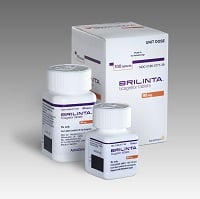 |
LONDON--Earlier this year, AstraZeneca touted positive Brilinta (ticagrelor) data from its PEGASUS trial, which found that long-term use of the drug plus aspirin helped prevent heart attacks, strokes and cardiovascular death in post heart-attack patients--and did so better than long-term aspirin plus placebo. And now. AstraZeneca ($AZN) is armed with new details from the study, showing that stopping Brilinta therapy too soon can heighten risks of those very events, helping make the case for long-term use of the drug.
As researchers found, patients who had suffered heart attacks between one and three years prior and discontinued use of an antiplatelet drug within the past 30 days experienced a higher risk of serious cardiac events than those who had quit the treatment earlier--regardless of how long it had been since their original heart attack. Those who went on Brilinta within that 30-day time frame saw their risk of developing a subsequent event cut by 27%.
In other words, the data suggest that stopping a P2Y12 antiplatelet drug--the class that includes Brilinta--comes with immediate risks. So, continuing Brilinta therapy beyond the one-year mark without interruption is the way to go, Marc Ditmarsch, AstraZeneca's global lead for Brilinta, told FiercePharma in an interview.
 |
| Brilinta global lead Marc Ditmarsch |
"It really supports a continuation of therapy for patients who have had an event in the past," he said. "This is really, in my view, a very insightful, additional assessment and very practical, supportive evidence to continue therapy for ticagrelor."
Longer Brilinta use is just what AstraZeneca would like to see happen. The British pharma has been touting the med's growth prospects for years, and expanding its use past the one-year mark would help get the company closer to the $3.5 billion sales goal it laid out early last year.
This weekend, the drugmaker won support from the European Society of Cardiology, which tweaked its guidelines to endorse potential use of P2Y12 blood thinners such as Brilinta--alongside aspirin--beyond 12 months.
But it's still waiting on marketing go-aheads on both sides of the pond, with an FDA decision expected by the end of September. And even if AstraZeneca wins the green light to tout long-term use of the drug, it will still be up to physicians to weigh Brilinta's potential benefits versus its bleeding risks. The new analysis shows, for instance, that starting Brilinta more than a year after stopping previous antiplatelet therapy might not make sense.
"You should not close your eyes," Ditmarsch cautioned. "There's a bleeding risk associated with antiplatelet therapy, and that is the assessment that they need to make."
AZ is working on a way to make that assessment easier, though. Last November, it started up a preclinical program on a potential Brilinta antidote, dubbed MEDI2452. And if it proves successful, it'll be able to quickly reverse the blood thinner's effects in the event of major bleeding.
- read the release
Special Report: The top 15 pharma companies by 2014 revenue - AstraZeneca | Top 10 Drug Launch Disasters - Brilinta